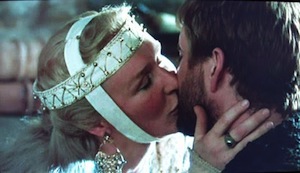Various solutions to the problem:
- the view, popularized by Goethe (1749 - 1832), "that Hamlet, for temperamental reasons, was fundamentally incapable of decisive action of any kind." -- Coleridge (1772 -1834) described Hamlet as one in whom "we see a great, an almost enormous, intellectual activity, and a proportionate aversion to real action consequent upon it."
- the view that the "extrinsic difficulties inherent in the task were so stupendous as to have deterred any one, however determined."
- In 1903 Andrew Cecil Bradley (1851 - 1935) summarized: See the Q & A.
- 1910, Ernest Jones:"The Oedipus-Complex as An Explanation of Hamlet's Mystery: A Study in Motive." -- 1921: T.S. Eliot's very famous (and very snotty) essay, "Hamlet and His Problems," in which Eliot defines "objective correlative" and declares that Hamlet "is most certainly an artistic failure." -- Laurence Olivier's Hamlet of 1948 -- Franco Zeffirelli's 1990 version starring Mel Gibson and Glenn Close -- I don't think it's an artistic failure, but T.S. Eliot points the way to something important: the play is not just a case study.
.jpg) |
 |
- Polonius: "to thine own self be true" -- "what was I about to say?" -- "Madam, I swear I use no art at all"
- The gravediggers
- Osric
- Hamlet: "As I perchance hereafter shall think meet / To put an antic disposition on"
- Ophelia about Hamlet's visit to her closet: "My lord, I do not know." This visit is something that Hamlet never mentions before or after. -- Compare to the elaborate business about the play within the play.
- Second Soliloquy >>> Third soliloquy
- Hamlet: "Now might I do it pat, now he is praying"
- "As Kill a king"
- Fourth Soliloquy >>> Horatio's comment.